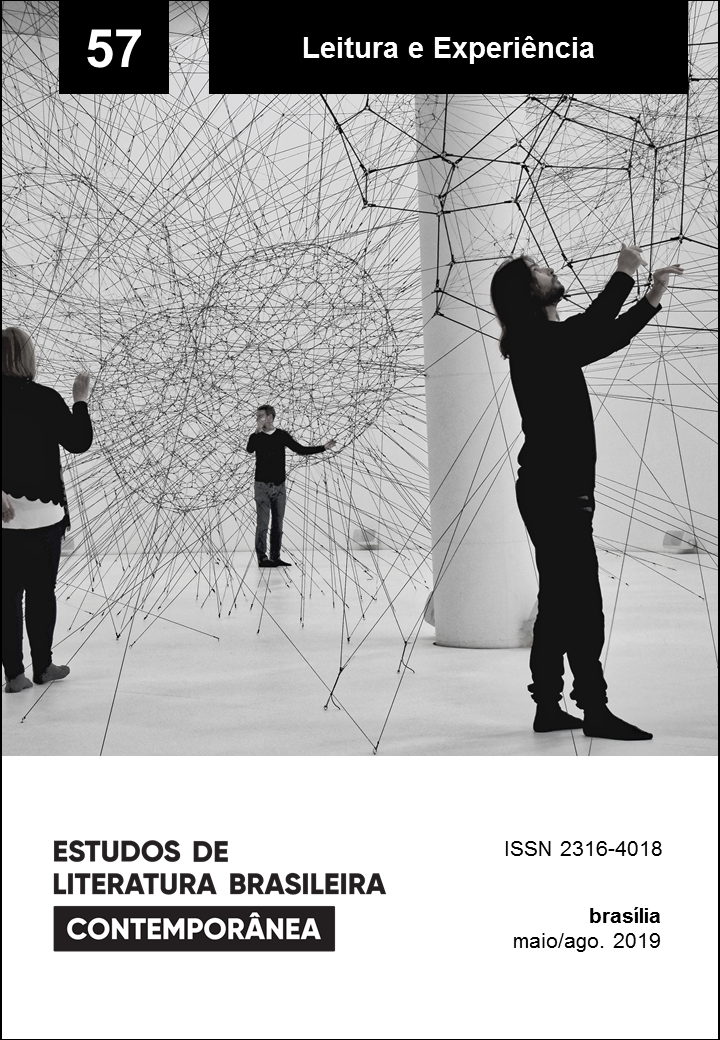A obsessão das ideias ou a literatura que fracassa: uma abordagem a partir de Marilene Felinto
DOI:
https://doi.org/10.1590/2316-40185718Palavras-chave:
Marilene Felinto, repetição, presença, leitura e fracassoResumo
Este artigo se utiliza da obra de Marilene Felinto para refletir sobre uma obsessão das ideias no campo literário, traçando, para tanto, uma linha entre o seu romance de estreia As mulheres de Tijucopapo (1982) e sua última publicação até o momento, a novela Obsceno abandono: amor e perda (2002). Esclarecida a obsessão em reincidências que problematizam a presença das narradoras, a começar por um estar no fracasso da linguagem, acreditamos que o traço possa esclarecer uma ideia de escrita aproximada da tentativa; escrever como uma volta constante ao próprio gesto de escrever, o que inevitavelmente colocaria em questionamento a literatura, seu poder e valor, igualmente a ideia idealizada de obra, principalmente quando o princípio de desrazão surge em nosso horizonte. Tais questões são circundadas ainda pela análise da corrente sugestão de que, na autora, narrativa de vida e de ficção se mesclariam, além de percebê-la num espectro literário maior em relação a Lima Barreto, e reduzido, em termos de contemporaneidade, em relação a Juliano Garcia Pessanha.
Referências
BARRETO, Lima (2017). Diário do hospício & O cemitério dos vivos. São Paulo: Cia das Letras.
BATAILLE, Georges (2014). O erotismo. Tradução de Fernando Scheibe. Belo Horizonte: Autêntica.
BLANCHOT, Maurice (2011). O espaço literário. Rio de Janeiro: Rocco.
CANÇADO, Maura Lopes (2015). Hospício é deus: diário I. 5. ed. Belo Horizonte: Autêntica.
COHEN, Renato (1998). Work in progress na cena contemporânea: criação, encenação e recepção. São Paulo: Perspectiva.
DALCASTAGNÈ, Regina (2012) Literatura brasileira contemporânea: um território contestado. Vinhedo: Horizonte.
DELEUZE, Gilles (2011). Crítica e clínica. 2. ed. São Paulo: Editora 34.
FELINTO, Marilene (2002). Obsceno abandono. Rio de Janeiro: Record.
FELINTO, Marilene (2004). As mulheres de Tijucopapo. 3. ed. Rio de Janeiro: Record.
GRIGOLETO, Grace Gonçalves; CAMARGO, Diva Cardoso de (2011). Análise de cinco vocábulos recorrentes e preferenciais na obra As mulheres de Tijucopapo, de Marilene Felinto. Rev. Est. Ling., Belo Horizonte, v. 19, n. 2, p. 141-165, jul./dez.
LEITE, Dante Moreira (2007). Ficção, biografia e autobiografia. In: LEITE, Rui Moreira (Org.). O amor romântico e outros temas. São Paulo: Editora da UNESP, p. 43-52.
PÉCORA, Alcir (2010). O inconfessável: escrever não é preciso. Sibila. Disponível em: https://bit.ly/2uR3DhL
PELBART, Peter Pál (1993). Da loucura à desrazão. In: PELBART, Peter Pál. A náu do tempo-rei: sete ensaios sobre o tempo da loucura. Rio de janeiro: Imago.
PESSANHA, Juliano Garcia (2015). Sabedoria do nunca. In: PESSANHA, Juliano Garcia. Testemunho transiente. São Paulo: Cosac Naify.
SANT’ANNA, Sérgio (2003). O voo da madrugada. São Paulo: Companhia das Letras.
Publicado
Edição
Seção
Licença
Autores que publicam nesta revista concordam com os seguintes termos:
a) Os(as) autores(as) mantêm os direitos autorais e concedem à revista o direito de primeira publicação, sendo o trabalho simultaneamente licenciado sob a Licença Creative Commons de Atribuição-Não Comercial 4.0, o que permite o compartilhamento do trabalho com reconhecimento da autoria do trabalho e publicação inicial nesta revista.
b) Os(as) autores(as) têm autorização para assumir contratos adicionais separadamente, para distribuição não-exclusiva da versão do trabalho publicada nesta revista (ex.: publicar em repositório institucional ou como capítulo de livro), com reconhecimento de autoria e publicação inicial nesta revista.
c) Autores têm permissão e são estimulados a publicar e distribuir seu trabalho on-line (ex.: em repositórios institucionais ou na sua página pessoal) após o processo editorial, já que isso pode gerar alterações produtivas, bem como aumentar o impacto e a citação do trabalho publicado (Veja O Efeito do Acesso Livre).
d) Os(as) autores(as) dos trabalhos aprovados autorizam a revista a, após a publicação, ceder seu conteúdo para reprodução em indexadores de conteúdo, bibliotecas virtuais e similares.
e) Os(as) autores(as) assumem que os textos submetidos à publicação são de sua criação original, responsabilizando-se inteiramente por seu conteúdo em caso de eventual impugnação por parte de terceiros.


